Welcome back to This Week in Apps, the Extra Crunch series that recaps the latest OS news, the applications they support and the money that flows through it all.
The app industry is as hot as ever, with a record 204 billion downloads in 2019 and $120 billion in consumer spending in 2019, according to App Annie’s “State of Mobile” annual report. People are now spending 3 hours and 40 minutes per day using apps, rivaling TV. Apps aren’t just a way to pass idle hours — they’re a big business. In 2019, mobile-first companies had a combined $544 billion valuation, 6.5x higher than those without a mobile focus.
In this Extra Crunch series, we help you keep up with the latest news from the world of apps, delivered on a weekly basis.
This week we’re continuing to look at how the coronavirus outbreak is impacting the world of mobile applications, including a dig into Houseparty’s big surge, layoffs at VSCO, Google’s launch of a “Teacher Reviewed” tag, Bumble’s virtual dating, plus changes to Instagram in support of small business and live streaming, among other things. Also this week, Google changed its Play Store guidelines, TikTok launched parental controls, a report suggested Apple may be expanding its Search Ads and more.
Coronavirus Special Coverage
Instagram adds features for supporting small businesses during pandemic
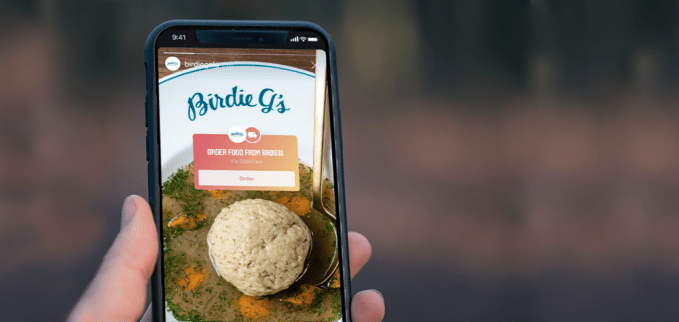 Instagram is making it easier for small businesses to feature gift cards, food orders and fundraisers on their profiles or in their Stores, thanks to new features released this week. Users can tap on a gift card or a food order to make a purchase on the business’s site, while fundraisers will redirect users to Facebook. The changes come at a time when 7.5 million U.S. businesses are at risk of closing due to the economic shutdown, CNBC reported.
Instagram is making it easier for small businesses to feature gift cards, food orders and fundraisers on their profiles or in their Stores, thanks to new features released this week. Users can tap on a gift card or a food order to make a purchase on the business’s site, while fundraisers will redirect users to Facebook. The changes come at a time when 7.5 million U.S. businesses are at risk of closing due to the economic shutdown, CNBC reported.
One example of a business adding the features is LA’s ChowNow, a restaurant-ordering platform that’s adding “order food” buttons and stickers for area restaurants to its images and videos.
VSCO lays off 30% of staff amid economic shutdown

As VC funding dries up amid the economic crisis, makers of popular photo editing app VSCO decided to lay off around 30% of staff, or 45 employees. The company framed the move as a way to make VSCO a self-sustaining business so it can stick around for a few more years.
Late last year, VSCO had said it was on pace to surpass 4 million paid subscribers by 2020 and was approaching $80 million in annual revenue. However, these projections were tied to VSCO’s forward investment this year, and the shift toward becoming self-sustainable will impact these numbers, the company says.
“2020 was staged to be a year where we would continue to forward invest into our business,” Flory wrote. “Overnight our environment changed,” he said in announcing the move.
Houseparty sees 50M sign-ups in the past month

Houseparty, the video chat application acquired by Fortnite maker Epic Games in 2019, has seen massive growth due to the COVID-19 pandemic. The company said its video chat service has seen 50 million sign-ups in the past month — a figure that’s around 70 times above normal in some markets. It’s unclear how many of those sign-ups were on mobile. Apptopia said 17.2 million and Sensor Tower said 28 million. Houseparty is also available across Mac and Chrome, however.
With government lockdowns keeping people from visiting friends and loved ones, consumer demand for video chat apps has skyrocketed. This has resulted in the video conferencing category of apps hitting record numbers in March, app store intelligence firm App Annie recently reported.
Kids trash Google Classroom with 1-star reviews
Kids don’t like remote school — and that’s a universal sentiment. In March, Chinese students tried to boot remote learning app DingTalk from the App Store by leaving bad reviews. Now U.S. students are doing the same to Google Classroom, reports 9to5Mac. The app hit record highs as schools shifted to online learning, reaching the top five in the U.S. App Store education charts, for example. But kids have also left thousands of one-star reviews, most of which complain about school — not the app itself.
Apparently, much of this is being triggered by a TikTok meme that’s recommending students rate the app one-star in order to get it removed. (The kids have it wrong — that doesn’t work. But nice try, kids!)
Games, entertainment apps and e-commerce booming in Europe
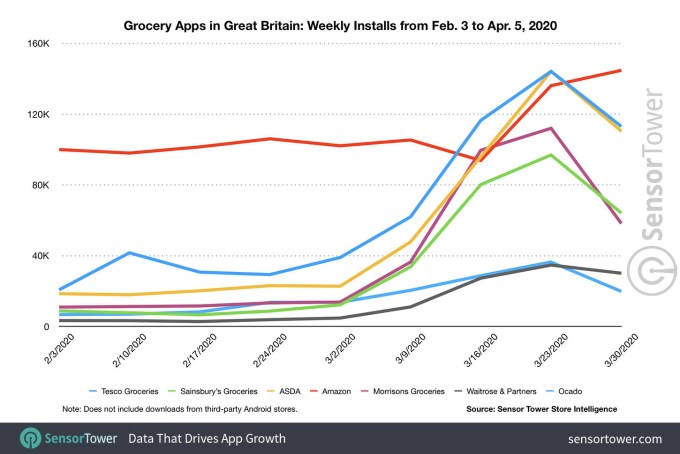
According to new data from Sensor Tower, Great Britain has seen downloads in the Shopping category in March reach 9.6 million, up 14% compared to January and up 15% from February. In Spain, downloads for the Mercadona app surged 193%, to 51,000, for the week of March 9, compared to the week prior, and jumped another 22% the following week. Italy saw big increases in downloads for shopping apps such as Supermercato24, EasyCoop and Esselunga OnLine during the week of March 9, when the country’s lockdown began.
The full report has more data on the growth of entertainment and fitness apps, as well as the decline in ride-sharing.
[gallery ids="1976281,1976282"]
The mobile games category in Europe, meanwhile, had its best-ever month for downloads in March 2020. New installs were up 19% from February to close to 1.2 billion, and up 14% from January 2020.
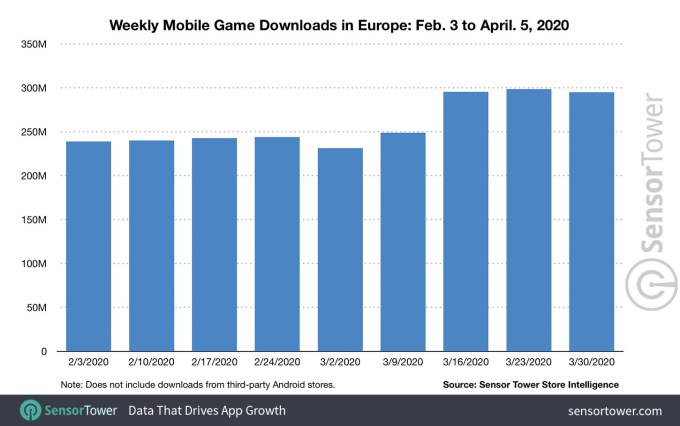
Google Play adds a “Teacher Approved” section to its app store
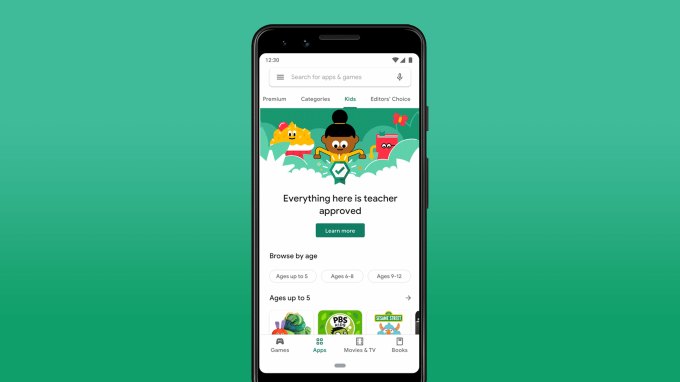
Google is making it easier for families to find quality educational apps to keep kids busy during the coronavirus lockdown with the addition of a “Teacher Approved” section to Google Play. All apps found in this section are vetted by a panel of reviewers, including more than 200 teachers across the U.S., and meet Google’s existing requirements for its “Designed for Families” program.
That program requires apps to meet government regulations around data collection and ad targeting and also limits the types of ads that can be displayed to children, if apps are ad-supported. The apps chosen for the section, however, don’t just meet the program’s minimum requirements — they’re also reviewed and rated highly by teachers. These may be apps teachers suggest for supplemental learning while others may just be used for fun.
To access the new section, you can either visit the “Kids” tab on Google Play or look for the “Teacher Approved” badge on any given app to see if it met with teachers’ approval. In addition, Google Play Pass will offer subscribers a selection of “Teacher Approved” content under the “Apps and games for kids” section. The apps will be grouped by age: 5 & under, ages 6-8 and ages 9-12. Google will also include information in the app’s listing about why it was rated highly.
ACLU gives Apple/Google contact tracing a mixed review
The ACLU looked at Apple and Google’s plans for coronavirus contact tracing and praised the companies for not tracking locations and for not using personally identifiable data. However, the app doesn’t allow users to confirm contacts logged, review data before upload and the ACLU says it’s not satisfied that the amount of data can’t be used to identify people.
Meanwhile, Sen. Richard Blumenthal says Apple and Google will need to demonstrate that contact tracing will not violate privacy.
TechCrunch this week joined a media call with Apple and Google representatives in which reporters asked questions about their coronavirus tracing efforts. Here’s the resulting Q&A, which covers details like what platforms will be supported, when various aspects of the system are available, how it all works and whether any other app makers will ever be able to use the API, among other things. (Spoiler alert: it’s probably a no.)
Instagram Live booms as people get stuck at home, boosting IGTV’s app once again
Instagram views are up 70% in the first week of April as users tune into the app for live content, including DJ music, exercise classes, comedy, celeb Q&As and more. There’s even a new website called Your Live Guide that aims to better organize live content and allows creators to post their schedules.
As a result, Instagram’s standalone IGTV app is finally seeing growth again. According to Apptopia, Daily Active Users are up 48% since March 15.

To cater to its growing number of users, Instagram this week redesigned its IGTV app by introducing a new home screen, a new Discover tab, hands-free video capturing and the ability to post a 15-second preview on Stories instead of just the freeze-frame, Android Community reported.
Bumble launches new features in support of social distancing
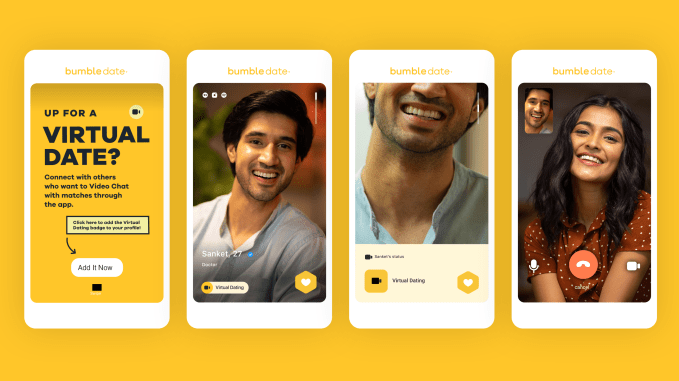
Match’s Tinder app already made it possible to use the traveling feature “Passport” during coronavirus lockdowns to match and chat with daters in other markets. Now Bumble is introducing a similar option. The dating app this week made it possible for users to look for matches “nationwide,” instead of just within a 100-mile range. It’s also adding an option for a “virtual dating” profile badge, and introducing audio notes in addition to video, voice calls and texts as a means of communicating with other daters.
Headlines
TikTok rolls out parental controls worldwide
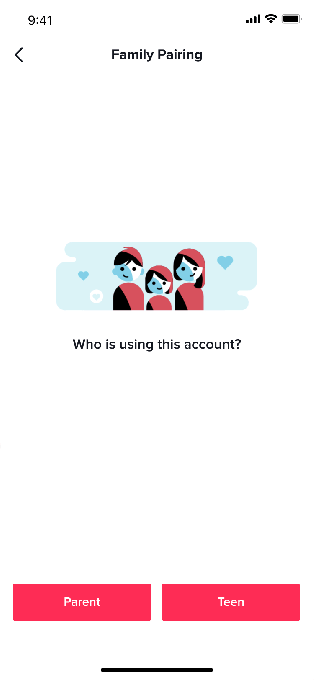
The No. 2 app on the U.S. app store, TikTok, announced this week it will be launching parental controls globally after a limited launch in the U.K. in February.
The features, collectively referred to as “Family Pairing,” will allow parents to set controls on Screen Time Management, Restricted Mode and Direct Messages for their teen users. It also will disable direct messaging for users under the age of 16 in all markets. Adding parental controls is an unusual move for a large social media application, but one that comes at a time when TikTok is under increased scrutiny for its China ties.
Google Play to cut down on ‘fleeceware,’ deepfakes and unnecessary location tracking
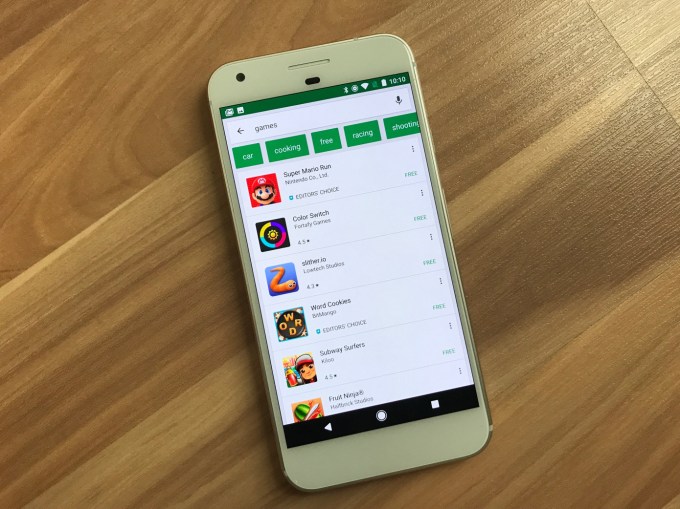
Google on Thursday announced a series of policy changes aimed at eliminating untrustworthy apps from its Android app marketplace, Google Play. The changes are meant to give users more control over how their data is used, tighten subscription policies and help prevent deceptive apps and media — including those involving deepfakes.
In February, Google said it would also soon require developers to get user permission before accessing background location data, after noting that many apps were asking for unnecessary user data. Many apps didn’t need background location to work, but used the permission anyway. (Perhaps developers were tempted by the potential to make money selling user data?)
The company is also cutting down on fleeceware subscriptions with a host of new rules around transparency and is adding “deepfakes” to the type of content being blocked.
Here are the deadlines for compliance:
- Background location: No action will be taken for new apps until August 2020 or on existing apps until November 2020.
- Subscriptions: Developers have until June 16, 2020 to come into compliance.
- Deepfakes: Apps currently available on Google Play have 30 days to comply with this change.
Apple to expand search ads?
According to a report by Adweek, Apple may soon start running search ads outside the App Store. The report is based on updates to an API that suggests an expansion of search ads into other apps like Maps and News. The API includes two new parameters: supplySource and adChannelType. The additional channels seem to be placeholders for other search inventory Apple owns, the report said, like Maps, News, Stocks or the Top Hit section in Safari.
Facebook launches an experimental app for Apple Watch

Attention Canadians: Facebook’s internal R&D group this week launched an app that lets you keep up with your close friends via your Apple Watch.
The app is called Kit, or Keep in Touch, and works using a combination of QR codes and Facebook’s existing Messenger service. The app allows you to send a variety of messages to a close friend with just one tap, including voice recordings, emoji, location sharing, scribbles and even dictation input. These messages are sent over Facebook’s own Messenger service, not SMS or iMessage. The app has a different UI than Messenger on Apple Watch, because you don’t have to navigate tiny menus. The app at launch was only being tested in Canada, but keep an eye out to see if that changes.
Quibi hits 1.7M downloads in week one
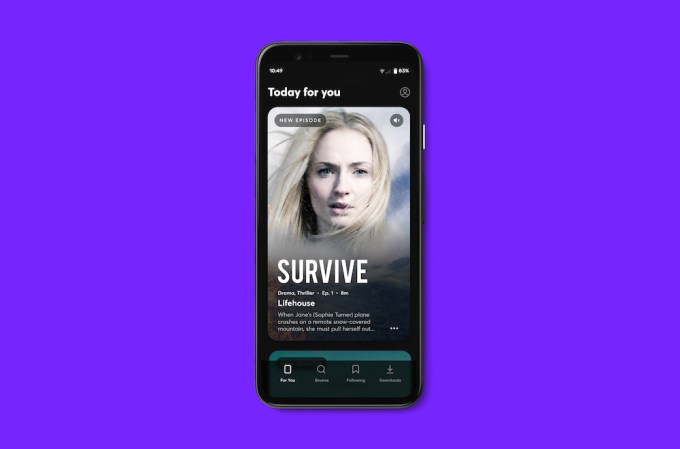
Image Credits: Quibi
Quibi managed to boost its app to 1.7 million downloads in the first week after an App Store promotion, heavy marketing and its tie-up with T-Mobile. In an interview with CNBC, Quibi CEO Meg Whitman confirmed the numbers reported for the app’s first week in release. The app hasn’t sustained momentum, however — it’s now No. 54 overall, and falling.
Plus, it was reported this week that Quibi is killing one of its more high-profile shows: a story about Snapchat’s founding focused on Evan Spiegel. That would have been a series that could have drawn in the Gen Z to millennial demographics the company hopes to attract.
Zoom to let customers pick a data center
Zoom, whose app has experienced huge growth during the coronavirus pandemic, has also struggled with security. This week, the company said it would allow paying customers to pick which data center their calls get routed from, following the news that Zoom had accidentally routed calls through China that shouldn’t have. It says that won’t happen again, but this seems like further assurance.
Google replaces some Android apps with web apps in Chrome OS
So much for the expansion of Android to Chrome OS. The mobile apps never really worked on Google’s web-based platform, as it turned out. And now Google is dialing back on some of its efforts, The Verge reported this week. The company will replace some Android apps with Progressive Web Apps (PWAs), making the Twitter PWA and YouTube TV PWA the default versions of the apps on the Play Store when you search for them on a Chromebook.
iOS adoption for new activations the highest since 2016
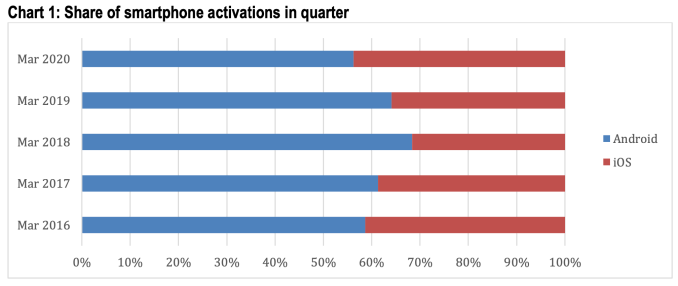
Data from analysts at CIRP for Q1 2020 shows that iOS had a 44% market share in the U.S. with Android grabbing the remaining 56%, reported 9to5Mac this week. Compared to the same quarter last year, iOS saw an 8% jump in new activations. But OS loyalty was high as well, at 90% for both iOS and Android.
Funding and M&A
- Airbrake raises $11 million to monitor for coding errors in real-time. The error-finding solution tells you what’s broken, where and why across apps built using a number of languages, including iOS and Android.
- Fitness app Aaptiv, a Netflix-style business that connects people to trainer-led programs, raises an undisclosed amount from Insight Partners following a surge in business.
- Mobile messaging startup Attentive raised another $40 million, bringing its Series C round to $110 million. The company now works with more than 1,000 businesses to manage their mobile messaging.
- Robinhood reported to be raising new funds at $8 billion valuation. Seems like all press was good press for the company.
- Avast acquisition of Seattle startup Tenta was just revealed with the release of Avast’s new private mobile browser for Android, based on Tenta’s codebase.
- Verizon (TC’s parent parent) bought B2B videoconferencing firm BlueJeans which offers cross-platform apps, including iOS and Android, for video calls. The price was “sub $500 million.”
Downloads
InHerSight
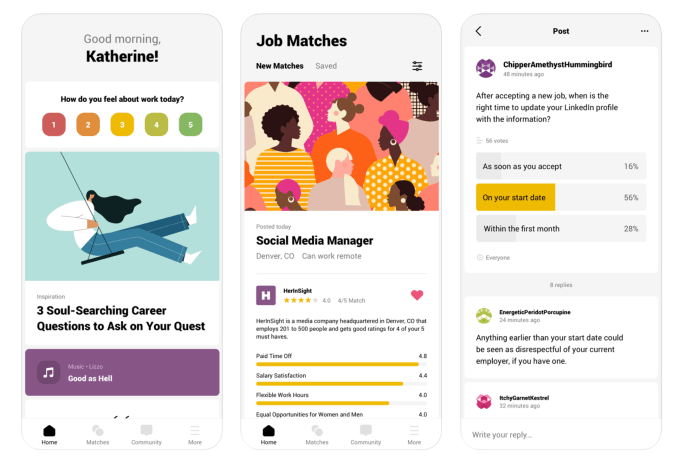
Nearly 60% of the more than 700,000 jobs lost in the first wave of pandemic layoffs were held by women. But women in search of a new job often have different requirements for employers compared with their male counterparts. Beyond the usual concerns around hours, salaries and benefits, women often want to know about a company’s culture, policies around work-life balance, child care, mentorship, growth opportunities and other factors. That’s where InHerSight’s new mobile app for women job seekers aims to help. The app aggregates job advice and sends 10 listings that match women’s specific criteria per day.
A revamped, stay-at-home friendly Pokémon GO

Pokémon GO maker Niantic has been working to make its outdoor game more stay-at-home friendly amid the coronavirus outbreak, now that users are asked to shelter in place to reduce the spread of the virus. This week, the game introduced “remote raids,” meaning you’ll be able to join any raid you can see on your “nearby” screen, rather than just those you can physically go to in person. The company is also hosting a new in-app event to boost usage, “Incense Day,” which will attract a different type of Pokémon.


